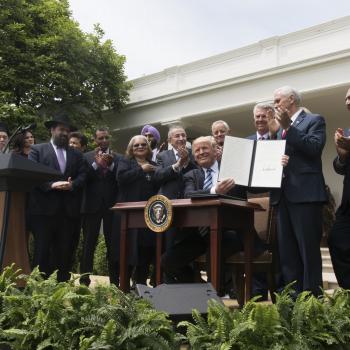By Rob Dalrymple
Is our current president an “instrument of righteousness”?
This question was posed to me by an acquaintance. Let me state at the outset that I am answering this question as a biblical scholar and not in terms of the current policital climate in the U.S. In other words, my answer would not change regardless of who the current president is, or what country I am writing about.
First, if one defines an “instrument of righteousness” in terms of a leader of a nation who is upholding the laws of the land in accord with his God-given responsibility, then it is easy to find some laws that even the most ruthless of leaders upholds and, thereby, conclude that that leader is such an instrument. In other words, almost anyone could argue that almost any leader is an “instrument of righteousness” based on this definition. This is a classic example of Edward Sapir and Benjamin Whorff’s principle “words create worlds”—which stated succinctly means that what people look for is what they find.
The primary problem, and there are many, with the suggestion that our current president is “an instrument of righteousness” is that it misunderstands what “righteousness” is, biblically speaking. “Righteousness,” in scripture, is not a moral category; it is always intimately tied to God’s covenantal faithfulness. See the phrase, “righteousness of God” throughout the books of Romans and Galatians.
An OT king could be such an instrument if he upheld the law of God (God’s covenant) for the nation of Israel—note the connection with the people of God.
In the New Testament, with the covenant with Israel fulfilled in Jesus, who begins “a new covenant,” an “instrument of righteousness” is one advancing the new covenant, which Jesus proclaimed is the Kingdom of God.
Kingdoms of the World
Thus, citing OT passages about God using kings to advance His kingdom is not applicable for Christians. Citing Romans 13 doesn’t work either because all Paul is saying is that those in authority are meant to do right—to maintain justice in the world. This is different from bringing in the justice of the Kingdom of God.
That is, national justice is not equal to justice done by the people of God—at least it cannot be when the people of God are no longer limited to a national identity. Instead, the people of God are composed of anyone who acknowledges that Jesus is Lord. If, then, an “instrument of righteousness” is one who advances the kingdom of God, then no secular leader can be one today (unless God were to bring a nation-state against the church in judgment; but there is no NT indication that such will occur.)
In addition, the NT is emphatic that the nations of the world stand opposed to the kingdom of God and as such are actually instruments of the devil. This is especially clear in Revelation 13 where the beast receives “his power, throne, and great authority” from the dragon (Rev 13:2).
Throughout the NT the Kingdom of God advances by means of the faithful, persevering, sacrificial, and loving witness of God’s people. The Kingdom of God stands opposed to the kingdoms of the world in that we proclaim Jesus is Lord while they proclaim Caesar is Lord.
A secondary problem arises with this presumption. Christians are to be “instruments of righteousness” by advancing the Kingdom of God in both word and deed to the nations. When Christians take a stand politically and endorse people or laws it is imperative that we ask ourselves: how will this affect our witness? The Church must learn to step back from partisan politics and critique matters in light of the Kingdom of God.
Concerning Trump

The main support offered for Donald Trump being an “instrument of righteousness” is his pro-life stance. There are serious questions as to whether or not Trump is actually pro-life—or just advocating pro-life policies because it is politically expedient. After all, he previously held to a pro-choice position.
Furthermore, in the NT, there is no question that for one’s deeds to be righteous, one must have the proper motivation and the proper heart. It is problematic, then, to endorse someone simply because they have expressed pro-life sentiments.
In addition, other views from Trump contradict a pro-life definition: his apparent white supremacist views; his endorsement of hatred towards people of the opposing political party (even suggesting that congresswomen who are American citizens be “sent back.”) And does not pro-life mean that we seek the well-being of Kurds? And women? And the Chinese people?
Isn’t building a wall the opposite of compassion towards those fleeing tyranny and seeking refuge? I am not suggesting that a nation cannot and should not defend its borders. Trump’s transgression is not really his desire to build a wall. It is his anti-immigration policy in the face of the largest global refugee crisis in history.
Finally, I worry that many non-Christians may well be thinking: if this is what an ‘instrument of God’ looks like, then I don’t want that God.














